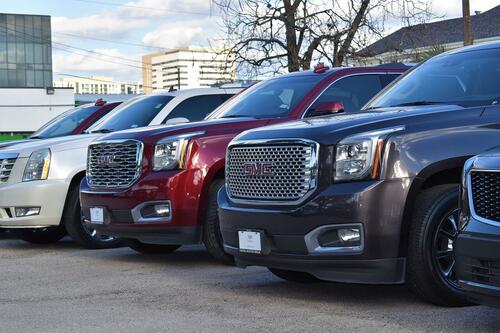
Authored by Michael Snyder via The Economic Collapse blog,
It appears that the crisis facing auto dealerships is far more dire than any of us thought.
Financial institutions are starting to get extremely tight with their money, and that is putting extreme stress on dealers all over the nation. Many of us expected that this would happen, but it seems that things are moving much faster than anyone would have anticipated.
Last week, I came across a tweet that absolutely floored me.
It was posted by a highly respected account known as “CarDealershipGuy”, and it contained some rather ominous news…
Past 10 days have been wild:
— Capital One shut off all dealer floorplans (aka inventory lines of credit)
— USA Auto Sales shut down 39 dealerships after losing its Ally floor plan
— Wells fargo laid-off all its junior Auto loan underwriters and capped future loans
Insanity.
Is all of this true?
I had to find out.
So I started digging around, and I discovered that Capital One has indeed decided to completely get out of the “floor plan financing” business…
It’s been a weird few years for the car market, and things could get weirder still. As first reported by Twitter user CarDealershipGuy and now confirmed by Automotive News reports, Capital One is out of the dealer “floor plan financing” business, and while I realize this may not sound like the sexiest of topics, it could have some interesting effects on the car market. In case you think of homes when you think of the term “floor plan,” allow me to introduce the way dealers are able to hold massive inventory.
Here’s a little secret: Dealerships usually don’t pay for every car on their lots, just like how consumers don’t usually buy cars outright. Instead, they take advantage of a form of financing called floor plan financing. Companies that offer this sort of financing give dealers lines of credit to buy vehicles with an interest-free period. If a car on floor plan financing sells within that period, the dealer takes the customer’s money or the customer’s lender’s money and uses some of it to pay off the line of credit. If a car doesn’t sell within that period, the dealership gets charged what has usually been a small fee since credit was nearly free for a decade. This allows a dealership to have very little money tied up in inventory despite amassing a huge selection of cars.
This is a really big deal.
A lot of dealers will simply not be able to operate without such financing.
Which brings us to the second point in the tweet. According to the official website of U.S. Auto Sales, they have “temporarily closed” all 39 of their dealerships…
Attention U.S. Auto Customers. We have temporarily closed our dealerships and are working on a solution to re-open them as soon as possible. But don’t worry, we aren’t going anywhere! U.S. Auto’s affiliated loan servicing company (USASF Servicing LLC) is still open to accept your payments and assist in servicing your account. Please continue to make your payments as scheduled and reach out to us with any account questions.
Hopefully U.S. Auto Sales will be able to secure another source of floor plan financing, but that may not be easy in this environment.
Another major chain, American Car Center, suddenly shut down more than 40 dealerships in February and has now filed for Chapter 7 bankruptcy…
American Car Center, the Memphis-based used car dealer which suddenly closed all locations in February, has officially filed for bankruptcy in a Delaware court.
According to federal court records, the company, also known as RAC Dealership, LLC, filed for Chapter 7 bankruptcy in the Delaware Bankruptcy Court on March 14.
Sadly, this is probably just the beginning.
A lot more dealerships are likely to go belly up as we get deeper into this economic downturn.
And as economic conditions deteriorate, financial institutions are likely to get even tighter with their money.
Which brings us to Wells Fargo. Apparently the bank really is giving the axe to all junior auto underwriting staff…
Wells Fargo laying off all junior Auto underwriting staff.
As of 4/27 any auto loans greater than 110% loan-to-value and 15% payment-to-income will be declined.
For more than a decade, the U.S. economy operated in an environment in which money was flowing like wine and it was really easy for everybody to get credit.
But now even officials at the biggest banks in America are openly admitting that a “credit crunch” has begun…
The credit crunch stemming from the fallout of Silicon Valley Bank has begun, with data showing clear tightening of lending standards by banks, according to Morgan Stanley’s top stock strategist Mike Wilson.
In a note on Sunday, the Morgan Stanley CIO said that the last two weeks have shown the steepest decline in lending on record as banks scramble to offset the breakneck pace of deposit flight, which has accelerated in the month since SVB failed.
“The data suggest a credit crunch has started,” Wilson said in the note, adding that $1 trillion in deposits has been withdrawn from US banks since the Federal Reserve began raising rates a year ago.
There is no possible way to spin “the steepest decline in lending on record” to make it sound good.
Our economy runs on mortgages, auto loans and credit cards, and so a dramatic reduction in lending will inevitably lead to a dramatic reduction in economic activity.
A lot of people are comparing this new crisis to what we went through in 2008 and 2009, because that is the only downturn in recent memory that is comparable.
Unfortunately, I am entirely convinced that this new crisis will eventually greatly surpass what we experienced during the Great Recession.
So I would encourage you to do whatever you need to do to get ready for harsh economic times, because what is ahead is not going to be pleasant for any of us.
* * *
Michael’s new book entitled “End Times” is now available in paperback and for the Kindle on Amazon.com, and you can check out his new Substack newsletter right here.
Authored by Michael Snyder via The Economic Collapse blog,
It appears that the crisis facing auto dealerships is far more dire than any of us thought.
Financial institutions are starting to get extremely tight with their money, and that is putting extreme stress on dealers all over the nation. Many of us expected that this would happen, but it seems that things are moving much faster than anyone would have anticipated.
Last week, I came across a tweet that absolutely floored me.
It was posted by a highly respected account known as “CarDealershipGuy”, and it contained some rather ominous news…
Past 10 days have been wild:
— Capital One shut off all dealer floorplans (aka inventory lines of credit)
— USA Auto Sales shut down 39 dealerships after losing its Ally floor plan
— Wells fargo laid-off all its junior Auto loan underwriters and capped future loans
Insanity.
Is all of this true?
I had to find out.
So I started digging around, and I discovered that Capital One has indeed decided to completely get out of the “floor plan financing” business…
It’s been a weird few years for the car market, and things could get weirder still. As first reported by Twitter user CarDealershipGuy and now confirmed by Automotive News reports, Capital One is out of the dealer “floor plan financing” business, and while I realize this may not sound like the sexiest of topics, it could have some interesting effects on the car market. In case you think of homes when you think of the term “floor plan,” allow me to introduce the way dealers are able to hold massive inventory.
Here’s a little secret: Dealerships usually don’t pay for every car on their lots, just like how consumers don’t usually buy cars outright. Instead, they take advantage of a form of financing called floor plan financing. Companies that offer this sort of financing give dealers lines of credit to buy vehicles with an interest-free period. If a car on floor plan financing sells within that period, the dealer takes the customer’s money or the customer’s lender’s money and uses some of it to pay off the line of credit. If a car doesn’t sell within that period, the dealership gets charged what has usually been a small fee since credit was nearly free for a decade. This allows a dealership to have very little money tied up in inventory despite amassing a huge selection of cars.
This is a really big deal.
A lot of dealers will simply not be able to operate without such financing.
Which brings us to the second point in the tweet. According to the official website of U.S. Auto Sales, they have “temporarily closed” all 39 of their dealerships…
Attention U.S. Auto Customers. We have temporarily closed our dealerships and are working on a solution to re-open them as soon as possible. But don’t worry, we aren’t going anywhere! U.S. Auto’s affiliated loan servicing company (USASF Servicing LLC) is still open to accept your payments and assist in servicing your account. Please continue to make your payments as scheduled and reach out to us with any account questions.
Hopefully U.S. Auto Sales will be able to secure another source of floor plan financing, but that may not be easy in this environment.
Another major chain, American Car Center, suddenly shut down more than 40 dealerships in February and has now filed for Chapter 7 bankruptcy…
American Car Center, the Memphis-based used car dealer which suddenly closed all locations in February, has officially filed for bankruptcy in a Delaware court.
According to federal court records, the company, also known as RAC Dealership, LLC, filed for Chapter 7 bankruptcy in the Delaware Bankruptcy Court on March 14.
Sadly, this is probably just the beginning.
A lot more dealerships are likely to go belly up as we get deeper into this economic downturn.
And as economic conditions deteriorate, financial institutions are likely to get even tighter with their money.
Which brings us to Wells Fargo. Apparently the bank really is giving the axe to all junior auto underwriting staff…
Wells Fargo laying off all junior Auto underwriting staff.
As of 4/27 any auto loans greater than 110% loan-to-value and 15% payment-to-income will be declined.
For more than a decade, the U.S. economy operated in an environment in which money was flowing like wine and it was really easy for everybody to get credit.
But now even officials at the biggest banks in America are openly admitting that a “credit crunch” has begun…
The credit crunch stemming from the fallout of Silicon Valley Bank has begun, with data showing clear tightening of lending standards by banks, according to Morgan Stanley’s top stock strategist Mike Wilson.
In a note on Sunday, the Morgan Stanley CIO said that the last two weeks have shown the steepest decline in lending on record as banks scramble to offset the breakneck pace of deposit flight, which has accelerated in the month since SVB failed.
“The data suggest a credit crunch has started,” Wilson said in the note, adding that $1 trillion in deposits has been withdrawn from US banks since the Federal Reserve began raising rates a year ago.
There is no possible way to spin “the steepest decline in lending on record” to make it sound good.
Our economy runs on mortgages, auto loans and credit cards, and so a dramatic reduction in lending will inevitably lead to a dramatic reduction in economic activity.
A lot of people are comparing this new crisis to what we went through in 2008 and 2009, because that is the only downturn in recent memory that is comparable.
Unfortunately, I am entirely convinced that this new crisis will eventually greatly surpass what we experienced during the Great Recession.
So I would encourage you to do whatever you need to do to get ready for harsh economic times, because what is ahead is not going to be pleasant for any of us.
* * *
Michael’s new book entitled “End Times” is now available in paperback and for the Kindle on Amazon.com, and you can check out his new Substack newsletter right here.
Loading…





